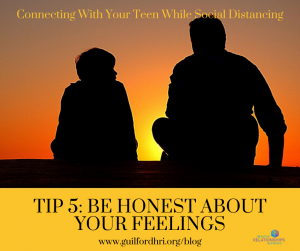
Oftentimes, as parents, we try and shield our teens from our worries or anxieties to help protect them from further stress. However, by being honest about your own feelings and concerns about the COVID-19 pandemic, you are creating a space in your home for open communication. Further, you are modeling for your teen that you are moving forward and adapting to the current changes in lifestyle, despite any concerns you may have about it all.
The reality is that teens are likely to have heard a lot about COVID-19. They are old enough to watch the news or go online, and they’ve probably helped you prepare for the possible quarantine by helping with younger siblings or helping to shop for supplies. By refraining from talking openly with your teen about your perspective, you are cutting off a line of communication that is useful in times of high stress and possibly inducing more stress due to the unknown.
You can let your teen know how you feel without inducing more panic, such as by expressing your feelings about your worries or emotions in a rational way. One way to balance this is by making clear and concise statements and following up with how you plan to cope. For example, you can say, “I am very worried about keeping our family business throughout all of this, but we will continue to work hard to keep things as stable for the family as we can.” Parents who are anxious about the uncertainty can say something like, “I’m very anxious about everything we do not know, but I am trying to stay informed by getting information from credible sources and taking care of my mental health.”
Supporting teens through the coronavirus pandemic is a new challenge for all of us, but by showing your teen that they are not alone in their emotions, you can help to stay connected during an uncertain time.
